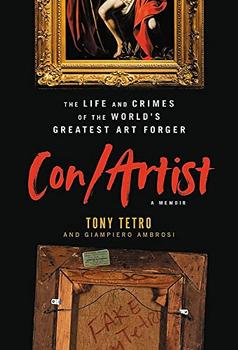Summary | Excerpt | Reviews | Beyond the Book | Readalikes | Genres & Themes | Author Bio

The Life and Crimes of the World's Greatest Art Forger
by Tony Tetro, Giampiero Ambrosi
My uncle, Anthony, who had come from Fulton a decade earlier, picked us up in his station wagon and we stayed at his ranch house in Montclair, a nice little town at the base of Mount Baldy. My father spent the next week driving us around the small highways and byways of greater Los Angeles to an endless array of roadside attractions. Now, these places would seem corny, but sixty years ago, to a nine-year-old kid, they were miracles of wonder and excitement.
There were places to eat, great never-ending smorgasbords where my dad piled magnificent roasts onto his plate and where you might have ten kinds of pie and ice cream. There were animal parks, aviaries, miniature railways, Old West towns, Indian villages, alligator farms, and pony rides—everything a young boy would love. Though it was February and too cold to swim, I pestered my father until he agreed to take us to the ocean. To me, the fact that you could have a pleasant, sunny beach day in the middle of winter seemed magical.
The next week, we all piled into the station wagon and headed across the desert toward Las Vegas, which was then just a sparsely built boomtown in the middle of endless rocks and sand. On the way, we stopped in Baker, California, at the famous Bun Boy restaurant, where we had the most delicious strawberry shortcake I'd ever tasted, with piles of giant, juicy fresh strawberries and mountains of whipped cream. Fresh strawberries in winter—what a miracle!
As we rolled into Las Vegas at night, you could see the lights and blinking marquees twinkling in the valley below. It seemed like magic. We stayed at the famous Stardust, which then was just a casino surrounded by separate motel sections with space-age names like Jupiter, Saturn, Venus, and Mars. At night, my parents got dressed up and went to a show while my brother Don and I stayed in the motel gorging on the dazzling array of TV channels that dwarfed the measly three we had in Fulton.
The next day, my father took me to the casino for a lucky spin on the slot machine. Though a security guard politely informed my father that children weren't allowed in the casino, I managed to pull the arm and see the wheels spin. I didn't win, but I felt about as lucky as any kid had ever been, and I didn't care. When we returned to Fulton a few days later, I recounted for weeks and weeks the wonders of California and the shining mirage that was Las Vegas as my friends listened in awe with their mouths agape.
Ten years later, my life in Fulton was in a depressing spiral and California had become a distant dream. After a year and a half of running milk deliveries, I had moved on to selling cheap furniture in a chain store called Roy's, and with the little money I earned, Marguerite, my daughter, and I just managed to get by with our dreary life. Before, my friends and I used to laugh at Fulton's "City with a Future" sign, but now it seemed more like a bitter joke on me.
That winter, like tens of millions of other miserable people in snow country, I watched with envy as vividly colored floats cruised down the sunny boulevards of Pasadena to the cheers and smiles of happy, attractive people at the famous Rose Parade. Stuck inside, I cursed the endless sheets of freezing snowfall raining down outside my window.
Months later, when my sister and her husband visited from California and brought with them the latest edition of the Los Angeles Times, I devoured every single page and column, remembering the magical trip I had taken as a kid. I must have read the classifieds for jobs and apartments a dozen times, and because I didn't have a clue about geography, I dreamed of living in Long Beach or Santa Monica or Downtown. The details didn't matter.
Over the next year, I worked hard and saved up $200, which I plowed into a stock tip I had gotten at the pool hall. Every day, I used to call a broker in Syracuse, who I had found in the telephone book, and asked him what the price of Benrus Watch Company was. Dollar by dollar, the stock started to climb slowly upward, and when it had finally doubled, I cashed out, quit my job, and told Marguerite that I would be leaving for California, where a better future for our family was waiting.
Excerpted from Con/Artist by Tony Tetro and Giampiero Ambrosi. Copyright © 2022 by Tony Tetro and Giampiero Ambrosi. Excerpted by permission of Hachette Books. All rights reserved. No part of this excerpt may be reproduced or reprinted without permission in writing from the publisher.




Only when we are no longer afraid do we begin to live
Click Here to find out who said this, as well as discovering other famous literary quotes!
Your guide toexceptional books
BookBrowse seeks out and recommends the best in contemporary fiction and nonfiction—books that not only engage and entertain but also deepen our understanding of ourselves and the world around us.